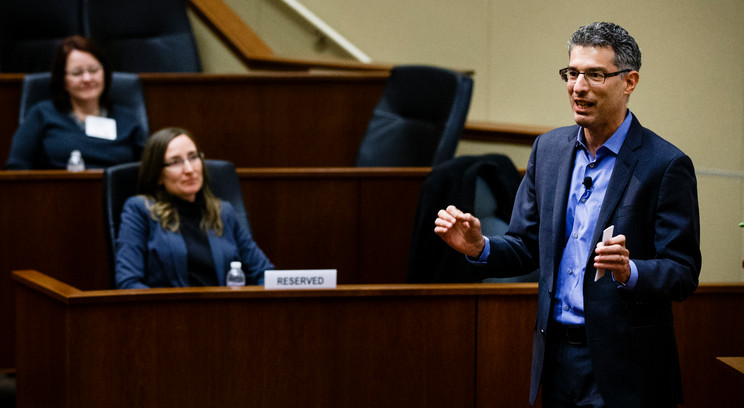Robert Safian was the speaker at the University of St. Thomas Opus Distinguished speaker’s program on Thursday, Nov. 14, 2013. I was in the audience as he reminded us that we are living in a time of constant and rapid change. Who is Robert Safian? He is the gregarious editor and managing director of the monthly business magazine Fast Company – which has nearly three-quarters of a million subscribers. He humbly explained that he is not the business expert; however, he is a curious, energetic journalist who has access to the movers, shakers and wannabes.
Safian and Fast Company’s mission is to seek out and stay on top of business trends and innovators, and to inspire "a new breed of innovative and creative thought leaders who are actively inventing the future of business." Safian describes himself on his Twitter account as a "believer in Generation Flux, optimist, family man, and delusional hoopster.” He was charming and engaging while he discussed his ideas regarding change and adapting to change.
Safian focused on managing change and quoted Darwin: Those who survive are those most adaptable to change. (After a quick fact-check, so not to misquote Safian or Darwin – Darwin supposedly did not write this line, but what he did write has been repeatedly paraphrased.) I can accurately quote Safian’s thoughts about change as in the November 2013 issue of Fast Company, he writes: “One could react to these ongoing waves of change with trepidation and cynicism. That too is a natural human response. But to resist these currents, we believe is ultimately self-defeating. Better to embrace the inevitable and hang on for the ride. It’s easier to swim downstream – and a whole lot more fun.” Fun sounds OK and much better than fighting the tide.
As the majority of the audience were UST MBA students and alumni, he highlighted that MBA programs should prepare students for the real world, and that the outcome of education should be learning how to learn. Sounds simple, but this requires a robust curriculum and engaged faculty and students. It was a timely message to students, staff and faculty.
So, how do you avoid becoming a dinosaur? Do you want to survive and thrive or do you want to go extinct as they “move your cheese”? Safian recommended to:
- Let go of the past.
- Focus on adding skills.
- Stay agile, fluid and be willing to adapt to change.
Safian described generation flux, which is not necessarily age related but based on attitude and adaptability. As an example of generation flux, he reviewed Arnold Schwarzenegger's bio. The visuals were priceless. He outlined three lessons of flux, aka change, in order to successfully survive.
- Take your ideas from everyone and breakdown silos in the workplace. (Light bulb: collaboration anyone?)
- Redefine the corner office. Is leadership of your organization hierarchical or inclusive? Back to lesson one, with his recommendation that collaboration equals innovation and improves the bottom line.
- Edit and simplify. You need to do more with less.
What does this mean to you? How do you recognize and manage change? What does this mean for me? Embrace technology, as I now need to sync my car, my phone, and TV. Yes, I do have a smart phone. Maybe the next leap will be purchasing an iPad Air. Heck, only $499. Or there’s always becoming a dinosaur. Weren’t most dinosaurs vegetarians? Look what happened to them. Oh well, off I go to McDonalds for a hamburger and fries to read the daily newspaper (paper version). I’ll let you know about the iPad.
P.S. If you have insomnia check out Arnold’s first movie, from 1970: "Hercules in New York"







